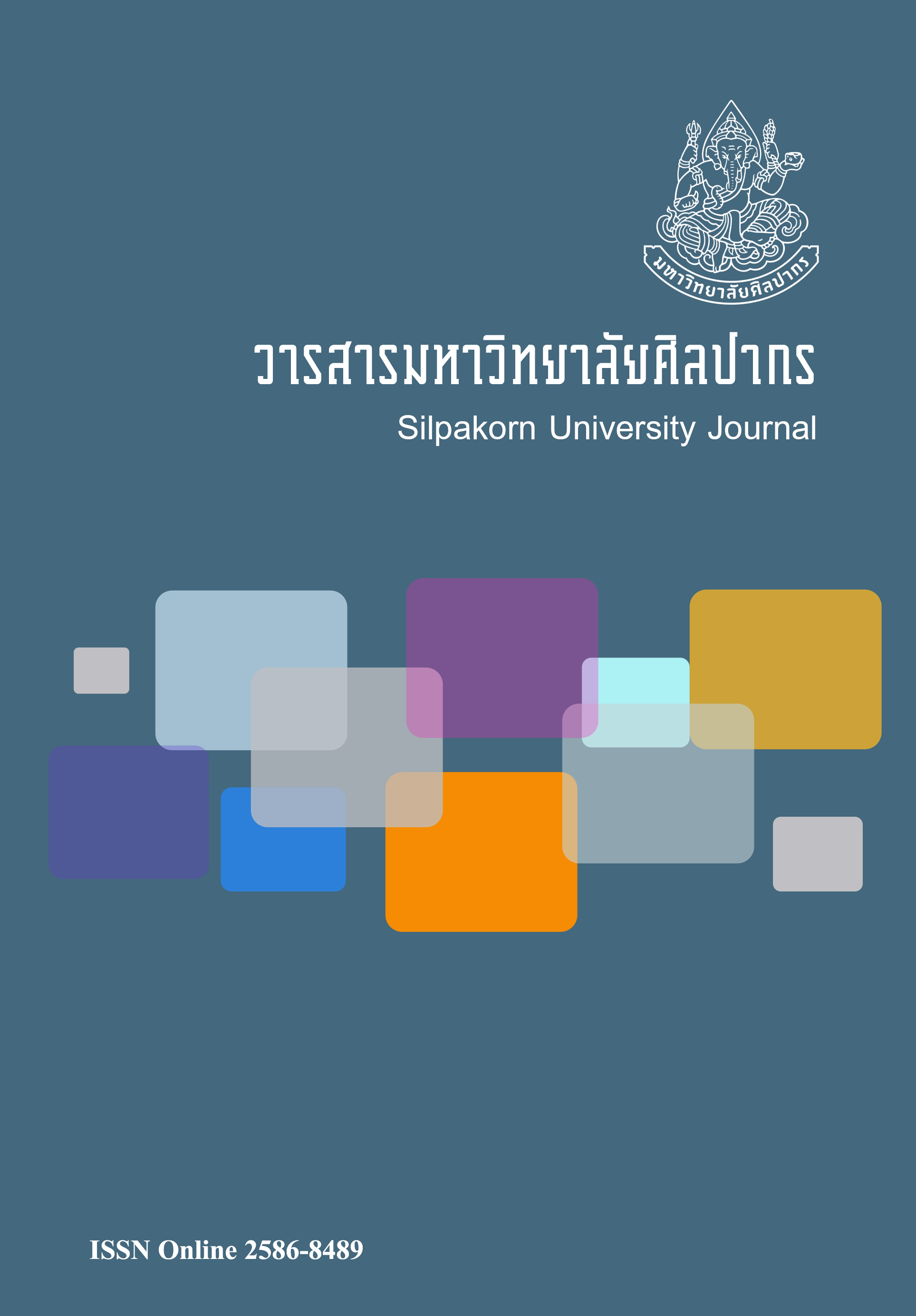แนวทางการขับเคลื่อนเกษตรอินทรีย์เพื่อสร้างความมั่นคงด้านอาหารปลอดภัยสำหรับชุมชน : บทสะท้อนจากภาคปฏิบัติการ (Guidelines to promote organic agriculture to food security and safety for community: reflection from the operating sector)
Main Article Content
บทคัดย่อ
การวิจัยเชิงคุณภาพนี้มีวัตถุประสงค์เพื่อศึกษาสถานะองค์ความรู้และความต้องการเกี่ยวกับเกษตรอินทรีย์ และนำเสนอแนวทางการขับเคลื่อนเกษตรอินทรีย์เพื่อสร้างความมั่นคงด้านอาหารปลอดภัยสำหรับชุมชนโดยศึกษาเฉพาะการปลูกพืชผักอินทรีย์ เก็บข้อมูลด้วยการวิเคราะห์เอกสารเชิงลึก การสัมภาษณ์เชิงลึกกับกลุ่มผู้ให้ข้อมูลหลักที่คัดเลือกแบบเจาะจง 3 กลุ่ม ได้แก่ 1) นักวิชาการเกษตร และอาจารย์มหาวิทยาลัย 2) เกษตรกรที่ทำเกษตรอินทรีย์ และทั่วไป และ3) ผู้นำชุมชน ตัวแทนภาครัฐและเอกชนที่ทำงานด้านเกษตรกรรม จำนวน 45 คน รวมทั้งการสำรวจพื้นที่แปลงเกษตรกร การพูดคุยอย่างไม่เป็นทางการ การประชุมกลุ่มย่อย การจัดเวทีสรุปและสะท้อนผลการวิจัยกับหน่วยงานที่เกี่ยวข้อง วิเคราะห์ข้อมูลด้วยการวิเคราะห์เนื้อหาและตรวจสอบข้อมูลด้วยเทคนิคสามเส้า ผลการวิจัย พบว่า สถานะองค์ความรู้และความต้องการ: เกษตรกรมีความรู้และความชำนาญในกระบวนการผลิต เนื่องจากผ่านการเรียนรู้จากการประกอบอาชีพและแหล่งเรียนรู้ต่างๆ ตลอดจนมีความสนใจและตื่นตัวในการผลิตและบริโภคสินค้าเกษตรอินทรีย์เป็นอย่างมาก แต่ยังขาดความเข้าใจที่ถูกต้องเกี่ยวกับเกษตรอินทรีย์ตามหลักวิชาการเพื่อเข้าสู่การรับรองมาตรฐาน และการประยุกต์ใช้เทคโนโลยีและวิทยาการสมัยใหม่ในกระบวนการผลิต รวมทั้งขาดความรู้เกี่ยวกับระบบการบริหารจัดการฟาร์มและกลไกการตลาดเพื่อรองรับผลผลิต แนวทางการขับเคลื่อนเกษตรอินทรีย์ พบว่า การสร้างมีส่วนร่วมของภาคีการพัฒนาสามารถผลักดันให้เกิดการขับเคลื่อนงานในระดับชุมชนได้อย่างยั่งยืน โดยภาคีที่เป็นแกนนำ คือ ชาวบ้าน/เกษตรกร กรมวิชาการเกษตร องค์กรปกครองส่วนท้องถิ่นทุกระดับ มหาวิทยาลัยที่จัดการเรียนการสอนด้านเกษตรกรรม โดยแนวทางการขับเคลื่อนเกษตรอินทรีย์ตลอดโซ่อุปทานการผลิต 4 ด้าน ได้แก่ ด้านปัจจัยการผลิต ด้านการผลิตและการจัดการ ด้านนวัตกรรมและเทคโนโลยีการผลิต และด้านผลผลิตและการจัดการผลผลิต ในรูปแบบการสร้างเครือข่าย การวิจัยและพัฒนาเชื่อมโยงองค์ความรู้เกษตรอินทรีย์พื้นบ้านและเชิงพาณิชย์ การพัฒนารูปแบบการรับรองมาตรฐานเกษตรปลอดภัยในระดับชุมชน การพัฒนาพัฒนาหมู่บ้านต้นแบบเกษตรอินทรีย์ การวิจัยต่อยอดและพัฒนาเครื่องทุ่นแรง การพัฒนาฐานข้อมูล ระบบการให้ข้อมูลและการให้คำปรึกษา
This qualitative research purposed to study the knowledge status and needs about organic griculture, and present guidelines to promote organic agriculture to food security and safety for the community. The study focuses on organic vegetable agriculture and reflection form the operating sectors. Collected data by in-depth document analysis, in-depth interview with key informants had been selected by the purposive sampling method; there are 3 groups who are 1) agricultural academicians and university professors 2) general and organic agriculturalists and 3) community leaders and representatives from the state and
the private sectors, totaling 45 persons. The study includes the survey on agricultural cultivations, informal discussion, focus group, and public discussion and reflection of the research result to related units. Analyze data by content analysis and validate data with triangulation technique. According to the research, knowledge status and needs: the agriculturalists have the knowledge and skill in production process due to learning from their career and learning sources; moreover, they are interest and alert to agricultural products and consumption greatly but lack accurate information about organic agriculture in compliance with standard certification, including technology adaptation and modern methods in production process, they also deprive of knowledge about farming management system and marketing mechanism to support products. For guidelines to promote organic agriculture, to encourage participation of the development associations is able to firmly push the operation into community level. The association leaders are the people/agriculturalists, Department of Agriculture, every local administration,and the universities that provide agricultural courses. About the guidelines to promote organic agriculture, the supply chain of the productions include 4 aspects that are production factors, production and management, innovation and technology in production, and products and product management. It comes up in the form of building a network, research and development in connection with organic agricultural knowledge in local and commercial levels, development of safety standard certification in community level, development of organic village model, further research and development of labor-saving devices, and information and advice system.
Downloads
Article Details
เอกสารอ้างอิง
Janon, N. (2014). Thailand food security (ความมั่นคงทางอาหารของประเทศไทย). Bangkok: The Secretariat of the House of Representatives.
Isvilanonda, S. (2014). Food security in Thailand: status, rural poor vulnerability, and some policy options (ภาวะคุกคามการเกษตรและความมั่นคงอาหารและทางออก). Special Lecture on “Power of local community participation to build innovation to manage healthy living” on 2nd March 2014 at Bangkok International Trade & Exhibition Centre, Bangna, Bangkok [online]. Retrieved February 1, 2016 from https://lams4research.files.wordpress.com
Office of Agricultural Economics. (2015). The second issues of national organic strategic plan from 2015-2021 (ยุทธศาสตร์การพัฒนาเกษตรอินทรีย์แห่งชาติ พ.ศ. 2558-2564). Bangkok: Ministry of Agriculture and Cooperatives.
Office of the National Economics and Social Development Board. (2016). The twelfth national economic and social development plan (แผนพัฒนาเศรษฐกิจและสังคมแห่งชาติฉบับที่ 12). Bangkok: Office of the National Economics and Social Development Board.
Panjamlong, S. (2011). Research for the local and the strengthen of food security in the community (กระบวนการวิจัยเพื่อท้องถิ่นกับการเสริมสร้างความมั่นคงทางอาหารของชุมชน). Bangkok: The Thailand Research Fund (TRF).
Raksachart, S. (2002). Food security of maginalized people: consumption patterns and sources of food of selected households in a Karen Community, Western Thailand (ความมั่นคงทางอาหารในระดับครัวเรือนของคนชายขอบ : รูปแบบการบริโภคและแหล่งที่มาของอาหารของครัวเรือนกะเหรี่ยงภาคตะวันตกประเทศไทย). Master’s dissertation of Science, Technology of Environmental Planning for Rural Development, Mahidol University.
Reunpitak, P. (2014). Future image of Thailand fights against the world’s food crisis (ภาพฉายแห่งอนาคตของไทย ฝ่าวิกฤตการณ์อาหารโลก) [online]. Retrieved February 1, 2016 from https://www.oie.go.th/sites/default/files/attachments/article/semi-WorldFoodCrisis.pdf
Srihadulchai, A., Watanajchariya, S., Supawan, D., & Photiyarach, S. (2014). Food and energy security in Thailand (ความมั่นคงทางอาหารและพลังงานของไทย) [online]. Retrieved February 1, 2016 from https://www.itd.or.th/ research-report
Srimook, S. (2013). Impact from using chemical in agriculture of Thailand (ผลกระทบจากการใช้สารเคมีทางการเกษตรของประเทศไทย). Bangkok: The Secretariat of the House of Representatives.
Srisuantang, S., Traimongkolkul P., & Pakpitcharean A. (2011). Development of knowledge network model in the rice commodity chain, NakhonPathom Province (การพัฒนารูปแบบการเชื่อมต่อองค์ความรู้ในเส้นทางสินค้าข้าว จังหวัดนครปฐม). Kasetsart Journal (Social Sciences), 32(3) (September-December), 418-430.
Srisuantang, S., Tanpichai P. & Jai-aree A. (2014). The study of human resource development guidelines for agricultural occupation (การศึกษาแนวทางการพัฒนาทรัพยากรมนุษย์เพื่อประกอบอาชีพเกษตรกรรม). Bangkok: The Thailand Research Fund (TRF)
United Nations Development Programme. (2009). Human Security in the Present and the Future (ความมั่นคงของมนุษย์ ในปัจจุบันและอนาคต) [online]. Retrieved February 1, 2016 from https://km.nmt.or.th


